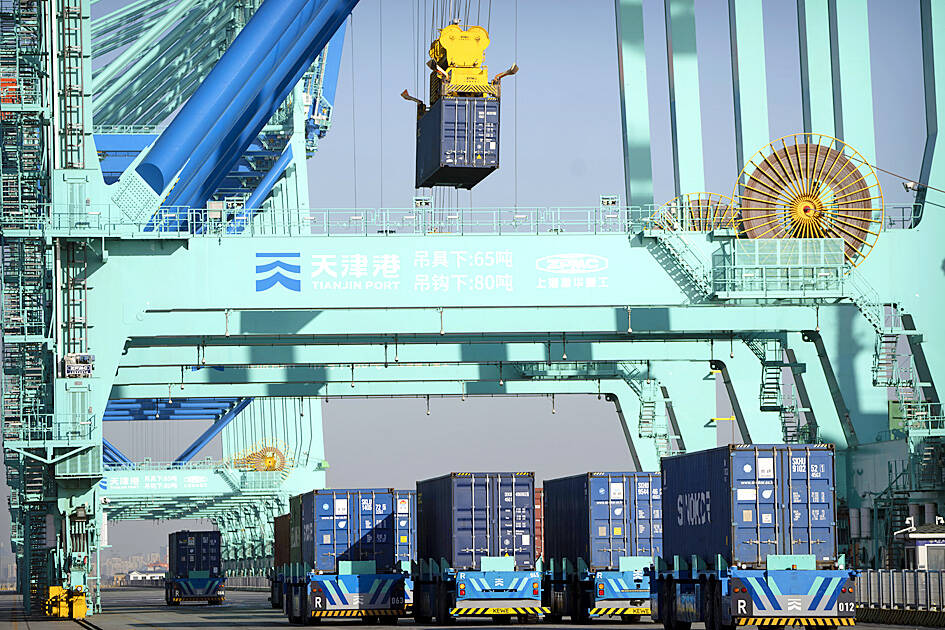China’s imports contracted sharply last month, while exports rose at a slower pace, reinforcing signs of feeble domestic demand despite the lifting of COVID-19 curbs and heaping pressure on an economy already struggling in the face of cooling global growth.
China’s economy grew faster than expected in the first quarter of this year thanks to robust services consumption, but factory output has lagged and the latest trade numbers point to a long road to regaining pre-COVID-19 momentum.
Inbound shipments to the world’s second-largest economy fell 7.9 percent year-on-year, extending the 1.4 percent decline seen a month earlier, while exports grew 8.5 percent, easing from the 14.8 percent surge in March, customs data showed yesterday.

Photo: AP
Economists in a Reuters poll had predicted no growth in imports and an 8 percent increase in exports.
“Given the gloomy outlook for external demand, we think exports will decline further before bottoming out later this year,” Capital Economics Ltd economist Zichun Huang (黃子春) said in a note.
“We still think reopening rebound in domestic demand will drive a recovery in imports over the coming months,” she added.
The downturn in imports suggests that the global economy is unlikely to be able to count much on China’s domestic engine of growth, and as the nation re-exports some of its imports, it also reinforces the extent of weakness in some of its major trading partner economies.
Analysts say the sharp global monetary policy tightening campaign of the past 12 to 18 months and recent Western banking stress remain concerns for the revival prospects of China and the world.
Shipment growth to ASEAN, China’s largest export partner, slowed to 4.5 percent last month from 35.4 percent in March.
Other data showed that South Korean exports to China, a leading indicator of China’s imports, were down 26.5 percent last month, continuing 10 consecutive months of decline.
China’s coal imports fell last month from a 15-month high the prior month, while imports of copper — a proxy for global growth — and natural gas were also down in the same period.
“The contraction of imports may be partly driven by the slowdown of global demand, which in turn affects China’s imports of parts and components for the processing of exports,” Pinpoint Asset Management Ltd (保銀私募基金管理) chief economist Zhiwei Zhang (張智威) said.
The official manufacturing purchasing managers’ index for last month showed new export orders contracting sharply, underlining the challenge facing Chinese policymakers and businesses hoping for a robust post-COVID-19 economic recovery.

STEEP DECLINE: Yesterday’s drop was the third-steepest in its history, the steepest being Monday’s drop in the wake of the tariff announcement on Wednesday last week Taiwanese stocks continued their heavy sell-off yesterday, as concerns over US tariffs and unwinding of leveraged bets weighed on the market. The benchmark TAIEX plunged 1,068.19 points, or 5.79 percent, to 17,391.76, notching the biggest drop among Asian peers as it hit a 15-month low. The decline came even after the government on late Tuesday authorized the NT$500 billion (US$15.2 billion) National Stabilization Fund (國安基金) to step in to buoy the market amid investors’ worries over tariffs imposed by US President Donald Trump. Yesterday’s decline was the third-steepest in its history, trailing only the declines of 2,065.87 points on Monday and

TAKING STOCK: A Taiwanese cookware firm in Vietnam urged customers to assess inventory or place orders early so shipments can reach the US while tariffs are paused Taiwanese businesses in Vietnam are exploring alternatives after the White House imposed a 46 percent import duty on Vietnamese goods, following US President Donald Trump’s announcement of “reciprocal” tariffs on the US’ trading partners. Lo Shih-liang (羅世良), chairman of Brico Industry Co (裕茂工業), a Taiwanese company that manufactures cast iron cookware and stove components in Vietnam, said that more than 40 percent of his business was tied to the US market, describing the constant US policy shifts as an emotional roller coaster. “I work during the day and stay up all night watching the news. I’ve been following US news until 3am

Six years ago, LVMH’s billionaire CEO Bernard Arnault and US President Donald Trump cut the blue ribbon on a factory in rural Texas that would make designer handbags for Louis Vuitton, one of the world’s best-known luxury brands. However, since the high-profile opening, the factory has faced a host of problems limiting production, 11 former Louis Vuitton employees said. The site has consistently ranked among the worst-performing for Louis Vuitton globally, “significantly” underperforming other facilities, said three former Louis Vuitton workers and a senior industry source, who cited internal rankings shared with staff. The plant’s problems — which have not

TARIFF CONCERNS: The chipmaker cited global uncertainty from US tariffs and a weakening economic outlook, but said its Singapore expansion remains on track Vanguard International Semiconductor Corp (世界先進), a foundry service provider specializing in producing power management and display driver chips, yesterday withdrew its full-year revenue projection of moderate growth for this year, as escalating US tariff tensions raised uncertainty and concern about a potential economic recession. The Hsinchu-based chipmaker in February said revenues this year would grow mildly from last year based on improving supply chain inventory levels and market demand. At the time, it also anticipated gradual quarter revenue growth. However, the US’ sweeping tariff policy has upended the industry’s supply chains and weakened economic prospects for the world economy, it said. “Now